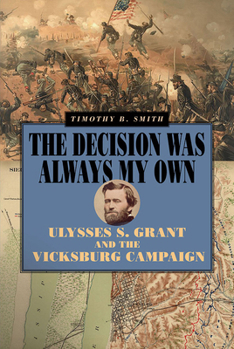The Decision Was Always My Own: Ulysses S. Grant and the Vicksburg Campaign
(Part of the World of Ulysses S. Grant Series)
The Vicksburg Campaign, argues Timothy B. Smith, is the showcase of Ulysses S. Grant's military genius. From October 1862 to July 1863, Grant tried repeatedly to capture the Confederate river city. His final, daring move allowed him to land an army in Mississippi and fight his way to the gates of Vicksburg. He captured the city and Confederate garrison on July 4, 1863, opening the Mississippi River for the Union.
This volume presents a fast-paced reexamination of Grant's decision-making process during the Vicksburg maneuvers, battles, and siege. Smith details the course of campaigning on military, political, administrative, and personal levels. The successful military campaign required Grant to handle President Lincoln's impatience, as well as to deal with troublesome general John A. McClernand, all while juggling administrative work. In addition, Grant was more than a military genius--he was also a husband and a father, and Smith shows how Grant's family played a role in every decision he made. Grant's nontraditional choices went against the accepted theories of war, supply, and operations, as well as against the chief thinkers of the day, such as Henry Halleck, Grant's superior. Yet Grant pulled off the victory in compelling fashion. In the first in-depth examination in decades, Smith shows how Grant's decisions created and won the Civil War's most brilliant, complex, decisive, and lengthy campaign.Format:Hardcover
Language:English
ISBN:0809336669
ISBN13:9780809336661
Release Date:July 2018
Publisher:Southern Illinois University Press
Length:272 Pages
Weight:1.10 lbs.
Dimensions:0.8" x 6.1" x 9.2"
Related Subjects
HistoryCustomer Reviews
0 rating





